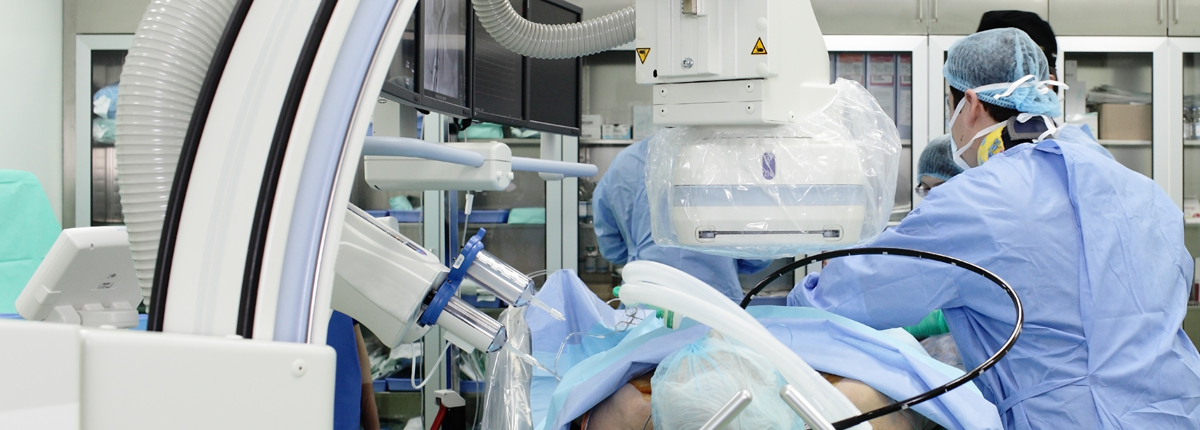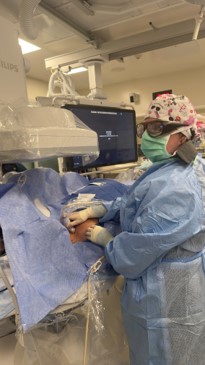Our Team
Interventional Radiology Division — Precision Medicine Without the Scalpel
Interventional Radiology (IR) is the fusion of radiology and surgery—delivering targeted, minimally invasive treatments using advanced imaging technology. Using real-time imaging such as MRI, CT, ultrasound, and fluoroscopy, IR physicians diagnose and treat complex conditions through incisions no larger than a pinhole—offering patients faster recovery, less pain, and reduced risk compared to traditional surgery.
Subspecialty Expertise in Interventional Radiology
Our Interventional Radiologists are certified by the American Board of Radiology in both Diagnostic Radiology and Vascular & Interventional Radiology, and recognized by the American Board of Medical Specialties. This dual certification reflects their advanced training and commitment to excellence in image-guided, minimally invasive procedures.
Our team functions like a surgical subspecialty group, providing comprehensive care at every step—from consultation to recovery. We prioritize safety, procedural success, and a smooth healing process. We provide comprehensive care that includes:
-
Outpatient Consultations
Our compassionate Interventional Radiologists take the time to explain each procedure in detail. They discuss the purpose and goals of treatment, provide a step-by-step procedural overview and discuss any potential risks and the expected outcomes.
We ensure every question is answered so patients feel informed, comfortable, and confident in their care decisions.
-
Pre- and Post- Procedural Coordination
Before your procedure, our team reviews imaging and medical history to tailor treatment, orders necessary lab tests (e.g., kidney function, clotting profile) and provides clear instructions for fasting and medication adjustments.
After your procedure, we monitor recovery closely, provide personalized discharge instructions and coordinate follow-up imaging and referrals to specialists as needed.
-
Inpatient Care for Adults and Children
Our Interventional Radiology team provides expert inpatient care for both adult and pediatric patients throughout Southern Arizona.
For adult patients, inpatient care is available for urgent or emergency procedures, complex interventions such as stent placements or tumor ablation, and for post procedural monitoring following sedation or anesthesia.
For pediatric patients, inpatient IR care supports the treatment of congenital conditions, cancer-related procedures, and recovery from sedation or anesthesia.
When needed, our Interventional Radiology team provides trusted care ensuring that all patients—regardless of age—receive safe, effective treatment with expert monitoring and personalized support throughout their hospital stay.
Procedures / Treatments
Our Interventional Radiology team performs a wide range of procedures across nearly every organ system using image-guided techniques. These include:
Genicular Artery Embolization (GAE)
Minimally invasive treatment for knee osteoarthritis, reducing blood flow to the knee lining for pain relief
Peripheral Arterial Disease (PAD)
PAD is a vascular condition commonly diagnosed in the legs or lower extremities. It involves the progressive narrowing or blockage of arteries responsible for transporting blood from the heart to the limbs. The primary underlying cause is atherosclerosis, a process in which fatty deposits, or plaque, accumulate along the arterial walls, impeding normal blood flow and potentially leading to pain, tissue damage, or other serious complications. Treatments offered include:
| Angioplasty | Balloon inflation to open narrowed vessels |
| Stents | Metal scaffolds to keep vessels open |
| Thrombolytic Therapy | Clot-dissolving medication (tPA) delivered via catheter |
| Stent-Grafts | Fabric-covered stents to bypass diseased arteries |
Venous Disease
Venous disease is a common vascular disorder where there is high pressure buildup in the veins. Treatments are offered for the following:
| Blood clots | clots occurring in the legs, arms, internal organs, brain (cerebral vein thrombosis), kidneys (renal vein thrombosis), or lungs (pulmonary embolism) |
| Deep vein thrombosis (DVT) | a blood clot that forms in a deep vein, typically in the arms or legs. While not immediately life-threatening, it can become dangerous if the clot travels to the lungs, causing a pulmonary embolism, a potentially fatal complication. |
| Superficial Thrombophlebitis | a blood clot that forms in a vein near the surface of the skin. While generally not life-threatening, it can cause localized pain and discomfort. |
| Chronic venous insufficiency | a condition in which impaired vein function leads to blood pooling in the legs, resulting in swelling, elevated venous pressure, skin discoloration, and the development of venous stasis ulcers |
| Varicose and spider veins | abnormal, dilated blood vessels that happen because of weakening in your blood vessel wall |
| Venous ulcers | Ulcers are wounds or open sores that do not heal or keep returning. Venous stasis ulcers most commonly occur below the knee, on the inner part of the leg, just above the ankle. |
| Arteriovenous fistulas | Abnormal connections between arteries and veins that bypass the capillary system, disrupting normal blood flow and potentially leading to serious vascular complications |
Thyroid Pathologies
Thyroid disorders arise when the gland produces either excessive (hyperthyroidism) or insufficient (hypothyroidism) levels of hormone, disrupting metabolic balance and overall health. Interventional Radiology offers effective, minimally invasive treatment options for a wide range of thyroid-related conditions, often serving as an alternative to surgical intervention.
Commonly Treated Thyroid Conditions:
- Hyperthyroidism
- Hashimoto’s Thyroiditis
- Thyroid Nodules and Tumors
- Thyroid Cancer
- Thyroid Disorders in Women
- Postpartum Thyroiditis
- Radiofrequency ablation (RFA) a minimally invasive treatment option performed by interventional radiology that provides an alternative to surgery for some patients with thyroid nodules. The procedure involves inserting a small needle electrode into the thyroid nodule using ultrasound guidance. Heat generated at the tip of the needle works to destroy the target tissue.
Cancer Treatments
| Hepatocellular carcinoma (HCC) | (HCC) is a type of liver cancer. It starts in the main type of liver cell, called a hepatocyte. |
| Renal Cell Carcinoma (RCC) | (RCC) is the most common type of kidney cancer. RCC forms in tiny tubes inside your kidneys called tubules. The tubules direct water and nutrients to your bloodstream, while filtering waste through your urine. Up to 85% of kidney cancers are RCC. |
| Metastatic colorectal cancer | Advanced-stage malignancy that originated in the colon and has traveled to other areas of the body. This is also referred to as metastatic (stage IV) colorectal cancer. |
Spinal Compression
Kyphoplasty is a minimally invasive procedure used to treat vertebral compression fractures. The procedure involves the injection of special cement into vertebrae — with the additional step of creating space for the treatment with a balloon-like device (balloon vertebroplasty). Kyphoplasty can restore a damaged vertebra's height and may also relieve pain.
Fibroid Tumors
| Uterine Artery Embolization (UAE) | (UAE) is an embolization procedure of uterine arteries to stop life- threatening postpartum bleeding, potentially preventing hysterectomy |
| Uterine Fibroid Embolization (UFE) | (UFE) is an embolization procedure of uterine arteries to shrink painful, enlarged, benign tumors in the uterus |
Clinical Facilities and Patient Care Services
We are proud to offer comprehensive consultation, follow-up, and procedural services across several state-of-the-art clinical locations, each designed to provide comfort, precision, and excellence in patient care.
Consultation & Follow-Up
- University of Arizona Cancer Center Located in an award-winning, spa-like 82,000 sq. ft. facility, the University of Arizona Cancer Center offers a serene and supportive environment for patient consultations and ongoing care. Designed with healing in mind, it combines advanced medical resources with a calming atmosphere to enhance the patient experience.
Interventional Procedures
- Banner – University Medical Center Tucson Campus
Banner-University Medical Center Tucson is a leading academic medical center equipped for a full spectrum of interventional radiology procedures, including image-guided biopsies, vascular access, and minimally invasive treatments. - Banner – University Medical Center South Campus
Banner-University Medical Center South offers a dedicated space for outpatient procedures and specialized care, ensuring accessibility and continuity across the Banner Health system.
Affiliated Imaging Services
- University Medical Imaging
University Medical Imaging, our imaging partner provides cutting-edge diagnostic capabilities, including:- High-field MRI for detailed soft tissue visualization
- 64-slice CT for rapid, high-resolution imaging
- Ultrasound for real-time, non-invasive diagnostics
- Computed radiography for efficient digital X-ray imaging
These imaging services support both diagnostic evaluations and procedural planning, ensuring seamless integration with our clinical care pathways.
Why Choose Us
Our Interventional Radiology team combines advanced technology, compassionate care, and clinical innovation to deliver exceptional outcomes for our patients. Here is what sets us apart:
- Minimally Invasive, Maximum Impact Our procedures are designed to minimize recovery time, reduce risk, and avoid the need for general anesthesia—allowing patients to return to daily life faster and with fewer complications.
- Convenient Outpatient & Short-Stay Options Most treatments are performed on an outpatient basis or require only a short hospital stay, offering comfort and convenience without compromising quality.
- Leaders in Non-Surgical Cancer Therapies We are pioneers in NanoKnife® (Irreversible Electroporation)—a cutting-edge, non-thermal technique for treating tumors without surgery, preserving surrounding healthy tissue.
- Southern Arizona’s Destination for PAE We offer Prostate Arterial Embolization (PAE) for benign prostatic hyperplasia (BPH), providing relief from urinary symptoms with a minimally invasive approach.
- Advanced Liver Cancer Treatment Our team performs Yttrium-90 (Y90) radioembolization, a targeted therapy for metastatic liver disease that delivers radiation directly to tumors with precision.
- Compassionate Care for Chronic Pelvic Pain We specialize in treating uterine fibroids and pelvic congestion syndrome, offering image-guided therapies that address pain and improve quality of life.
- Driven by Innovation Our commitment to research and protocol development ensures patients have access to the latest advancements in interventional radiology.
Appointments and Scheduling
Call (520) 694-1104




